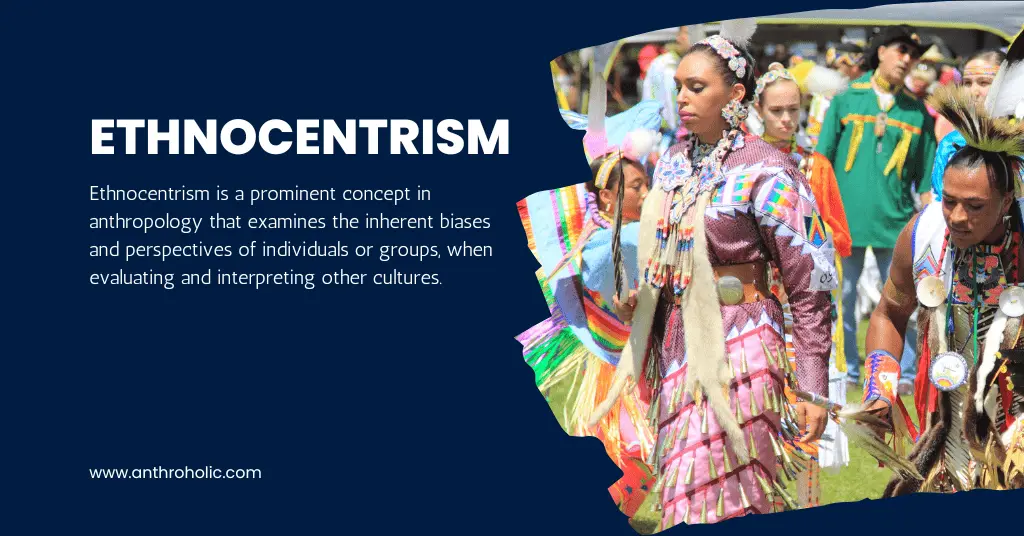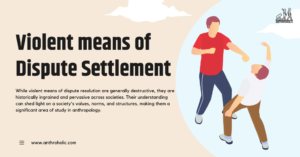AI Answer Evaluation Platform Live Now. Try Free Answer Evaluation Now
Ethnocentrism
Anthropologists are interested in the nuanced study of human civilizations and strive to understand the subtleties that make up the rich fabric of global society. They explore three key ideas—cultural relativism, ethnocentrism, and cultural universals—that serve as the cornerstones of modern anthropological investigation in this succinct introduction. These ideas give us a scientific framework through which we may more clearly understand and value the enormous variety of cultural customs, religious beliefs, and social institutions that influence human existence.

Ethnocentrism is a prominent concept in anthropology that examines the inherent biases and perspectives of individuals or groups, when evaluating and interpreting other cultures. In simpler terms, ethnocentrism can be defined as the inclination of individuals or groups to judge and assess other cultures based on the standards, values, and beliefs of their own culture. It arises from the conviction that one’s own cultural practices, customs, and ideologies are superior to those of others, leading to a disregard or devaluation of cultural diversity. Ethnocentrism can manifest in various degrees, ranging from subtle biases to extreme forms of prejudice.
Cultural relativism stands as a central principle in our anthropological endeavors, demanding that we suspend our own cultural biases and adopt a relativistic perspective when examining different societies. This method acknowledges that each culture has its own unique set of standards, norms, and customs that are influenced by social, historical, and environmental circumstances. We work to transcend ethnocentric tendencies and respect the diversity and complexity of human experiences across time and geography by appreciating the relativity of cultural systems.
Within the realm of cultural universals, we explore the commonalities that persist across human societies despite their cultural diversity. These universals cover the core human desires and conduct that transcend particular cultural situations. We discover that certain shared characteristics of the human experience serve as the foundation upon which cultures emerge and flourish, ranging from the universal search for nutrition and shelter to the intrinsic drive for social connection and communication. By researching cultural universals, we can learn more about how human civilizations are adaptable and how they address shared problems and desires.
In the current article, we are going to focus on the concept of -‘Ethnocentrism’. Remember when Europeans embarked on voyages to distant lands, they often experienced astonishment and indignation upon encountering unfamiliar customs? —an unsurprising reaction. Individuals perceive their own behaviors and attitudes as inherently correct, leading them to view those who deviate from these norms as morally flawed or of lesser quality. To an observer from a different society, our own cultural practices and beliefs may seem peculiar or uncivilized. For instance, Hindus in India would find the act of consuming beef repulsive. Within their cultural framework, the cow holds sacred significance and is strictly prohibited from being slaughtered for culinary purposes. By approaching our anthropological research through a scientific lens, we hope to deepen our understanding of human cultures, promote intercultural communication, and help create a more inclusive environment around the world. Through this article, we strive to unravel the intricacies of cultural diversity, while simultaneously recognizing the shared humanity that binds us all.
What is Ethnocentrism?
With its tendency to influence how we see and evaluate different cultures, ethnocentrism has a big impact on how we interact with and comprehend the world. To promote cross-cultural empathy, appreciation, and respectful involvement, ethnocentric tendencies must be identified and addressed. Numerous factors, including ethnocentrism, can influence how we make decisions, leading to biased observation. Cultural hubris is one example of ethnocentrism; it occurs when people or groups think their cultural norms, beliefs, and practices are superior to those of others. This haughtiness can appear in a variety of ways, including criticizing the accomplishments of other nations or mocking or discarding strange rituals. Another example is cultural imperialism, which frequently takes the form of colonization or globalization processes and involves a dominating culture trying to impose its values, beliefs, and way of life on other cultures. Indigenous cultures may deteriorate and there may be a loss of cultural diversity as a result of this imposition.
Examples of Ethnocentrism:
- Language Ethnocentrism: One example of ethnocentrism is language bias, where individuals consider their native language as superior to others. This attitude can lead to the devaluation or dismissal of languages different from their own. For instance, the dominant perception that English is the global lingua franca can marginalize and undervalue other languages and linguistic diversity [1].
- Historical Ethnocentrism: Ethnocentrism can also influence historical accounts, where the achievements and contributions of certain cultures are disproportionately highlighted while others are overlooked or diminished. This selective representation reinforces biased perspectives and perpetuates cultural hierarchies, distorting our understanding of the past [2].
Consequences of Ethnocentrism:
Ethnocentrism can have significant negative effects on international interactions as well as the cultures being appraised. It may put up hurdles to empathy and comprehension, leading to miscommunications and conflicts between people and communities. Ethnocentrism impedes the growth of inclusive and egalitarian societies by maintaining prejudices and preconceptions. It can also get in the way of cross-cultural cooperation and efforts to solve global problems. Opportunities for mutual learning and cooperation are lost when diverse cultures fail to acknowledge and value the distinctive views and knowledge systems of others.
The Negative Effects of Ethnocentrism
The widespread phenomena of ethnocentrism has significant effects on cross-cultural encounters and the development of understanding across different cultures. It is crucial for anthropologists to thoroughly examine the detrimental effects of ethnocentrism in order to illuminate its significant ramifications. Therefore, it is essential to examine the negative effects of ethnocentrism, such as the maintenance of preconceptions and prejudices, obstruction of effective communication, and restriction of cultural development. Below are the given negative effects of ethnocentrism:
- Limited Perspective and Cultural Bias: Ethnocentrism narrows our worldview, preventing us from fully appreciating the diversity and complexity of human cultures. When individuals view their own culture as superior, they tend to dismiss or devalue the practices, beliefs, and customs of others. This cultural bias obstructs our ability to understand and engage with different societies, hindering the progress of social and scientific knowledge [3]. For instance, in the 16th century, European explorers encountered indigenous civilizations in the Americas. Ethnocentrism influenced their perception, causing them to view the indigenous cultures as “primitive” and inferior. This biased perspective hindered the exploration of valuable scientific knowledge that these civilizations had developed, such as advanced agricultural techniques and medicinal plants.
- Intolerance and Conflict: Ethnocentrism fosters an atmosphere of intolerance and hostility towards other cultures. When individuals believe their culture to be superior, it often leads to discrimination, prejudice, and even violence against those who are different. History is replete with examples of ethnocentric conflicts, from colonialism to ethnic cleansing and genocides [4]. Consider the Rwandan genocide in 1994, where deep-rooted ethnocentrism played a significant role. The Hutu majority perceived the Tutsi minority as a threat to their cultural dominance, fueling a brutal ethnic conflict that claimed the lives of nearly a million people. This tragic event highlights the extreme consequences of ethnocentrism when it goes unchecked.
- Impediment to Cultural Exchange and Cooperation: Ethnocentrism impedes meaningful cultural exchange and cooperation between societies. It creates barriers and hampers the ability to build bridges of understanding and mutual respect. By valuing one’s own cultural practices over others, opportunities for collaboration and the exchange of knowledge are diminished, limiting progress on a global scale [5]. For example, ethnocentrism has been a significant barrier to international efforts addressing climate change. The reluctance of some countries to accept responsibility for their carbon emissions and adopt sustainable practices is often rooted in cultural biases and a failure to recognize the shared responsibility of all nations. This impedes global cooperation, making it challenging to address this pressing issue effectively.
- Stagnation of Societal Development: Ethnocentrism can hinder the progress and development of societies by discouraging the adoption of beneficial ideas and practices from other cultures. When societies close themselves off to external influences, they miss out on valuable opportunities for growth, innovation, and advancement [6][7]. The Edo period in Japan (1603-1868) provides an example of how ethnocentrism can impede societal development. The strict isolationist policies enforced during this time restricted foreign influence, resulting in limited technological advancements and cultural exchange. Japan’s eventual opening to the world in the Meiji era marked a transformative period that propelled the country’s rapid modernization and development.
The negative effects of ethnocentrism on cross-cultural understanding emphasize the importance of cultivating cultural relativism and fostering an open-minded approach towards different cultures. Hence, anthropologists have a responsibility to promote intercultural empathy, respect, and cooperation by challenging ethnocentric tendencies and facilitating meaningful intercultural exchanges.
Ethnocentrism and Prejudice
Ethnocentrism often leads to the formation of stereotypes and prejudices towards other cultures. When individuals possess ethnocentric biases, they tend to oversimplify and generalize cultural practices, beliefs, and behaviors, reducing the immense diversity and complexity of cultures into simplistic categories [8]. This simplicity not only dilutes the diversity and depth of other cultural systems, but it also encourages prejudice and misperceptions. In an effort to comprehend the complex interplay between cultural relationships, anthropologists investigated profoundly into the complicated tapestry of human societies. Two interconnected phenomena—ethnocentrism and prejudice—stand out in this huge network of variation.
- The Seeds of Ethnocentrism: Ethnocentrism often finds its roots in a deep sense of cultural identity and pride. When individuals possess a strong attachment to their own culture, they may inadvertently view it as superior, leading to a biased perspective that shapes their interactions with others. This ethnocentric viewpoint can manifest in various ways, from dismissing alternative cultural practices as “strange” or “inferior” to a reluctance to engage with or understand different belief systems [2]. For instance, consider the historical encounters between European colonizers and indigenous peoples. Ethnocentric attitudes fueled a superiority complex, leading to the suppression and erasure of indigenous cultures, as colonizers deemed their own cultural norms and values as the only valid and progressive ones. This resulted in the marginalization and loss of rich cultural heritage.
- Ethnocentrism’s Offspring: Prejudice emerges as a consequence of ethnocentrism, perpetuating stereotypes, discrimination, and social exclusion. When ethnocentric beliefs become deeply ingrained, individuals may harbor prejudiced attitudes toward those who differ from their own cultural or ethnic background. These biases can create significant barriers to social cohesion and intercultural understanding [4]. For example, xenophobia, a form of prejudice rooted in ethnocentric sentiments, has been observed in various contexts. In the early 20th century, as waves of immigration swept across the United States, ethnocentric biases fueled anti-immigrant sentiment, leading to the enactment of restrictive immigration policies. Such prejudices not only hindered the integration of diverse cultures but also perpetuated divisions within society.
- Breaking the Cycle: While ethnocentrism and prejudice are deeply ingrained in human psychology, it is crucial to recognize and challenge these biases to foster a more inclusive and harmonious world. Anthropological research offers valuable insights into effective strategies for combating ethnocentrism and prejudice. One such approach is intercultural education and exposure. By promoting cross-cultural interactions and providing opportunities for individuals to learn about and engage with different cultures, we can cultivate empathy, understanding, and appreciation for diversity. Educational initiatives, cultural exchange programs, and collaborative projects can break down stereotypes and foster meaningful connections [5]. The Robben Island Museum in South Africa serves as a powerful example of transformative intercultural education. The museum, located on the former prison island where Nelson Mandela was incarcerated, provides visitors with immersive experiences, storytelling, and dialogues that challenge ethnocentric narratives. By confronting the injustices of apartheid and celebrating the triumph of human resilience, the museum fosters empathy and helps break the cycle of prejudice.
Ethnocentrism and prejudice are complex phenomena deeply intertwined within the fabric of human societies. However, by acknowledging and understanding their origins and manifestations, we can strive for a more inclusive and equitable world. Through intercultural education, exposure, and fostering empathy, we can dismantle the barriers that divide us and pave the way for meaningful intercultural connections and mutual respect.
Ethnocentrism and Intercultural Communication
Ethnocentrism poses a significant obstacle to effective intercultural communication. Individuals influenced by ethnocentric biases approach cross-cultural interactions with a bias towards their own cultural norms, leading to misinterpretations and misjudgements of the intentions and meanings behind the behaviors and communication styles of others [9]. These miscommunications often result in misunderstandings, conflicts, and a breakdown in communication channels. For instance, cultural nuances, non-verbal cues, and contextual factors can vary significantly across cultures, and failure to recognize and respect these differences can hinder effective communication. Such miscommunication can occur in various settings, ranging from international business negotiations to diplomatic relations, where cultural sensitivity and understanding are crucial. Ethnocentrism poses a formidable barrier to effective intercultural communication, impeding understanding, cooperation, and harmony between diverse communities. Moving forward in this article, we will explore the relationship between ethnocentrism and intercultural communication, providing real-world examples and scientific insights to highlight the importance of bridging the gap of understanding.
- The Ethnocentric Lens: Ethnocentrism influences our perceptions, shaping how we interpret and communicate with individuals from different cultural backgrounds. When we view the world through an ethnocentric lens, our own cultural norms and values become the yardstick by which we judge and evaluate others. This biased perspective inhibits our ability to understand and appreciate the rich tapestry of cultural diversity [2]. For instance, in international business settings, ethnocentrism can hinder effective communication and collaboration. Companies expanding into foreign markets may encounter difficulties when they fail to acknowledge and adapt to the cultural nuances of their target audience. Ethnocentric assumptions about consumer preferences or business practices can lead to misunderstandings, ultimately impacting the success of their endeavors.
- Shifting Perspective: Cultural relativism offers an alternative perspective to ethnocentrism, emphasizing the importance of understanding and respecting diverse cultural practices and beliefs without imposing one’s own values. By adopting a culturally relativistic approach, we can foster open-mindedness and empathy in intercultural interactions, enabling meaningful communication and mutual learning [8]. An example of cultural relativism in action can be seen in the field of medical anthropology. When healthcare professionals work with diverse populations, cultural relativism allows them to understand and respect different health beliefs and practices. This approach promotes effective communication, trust, and collaboration, leading to better healthcare outcomes for culturally diverse communities.
- Building Intercultural Communication Skills: To overcome the challenges posed by ethnocentrism, developing intercultural communication skills is essential. It involves acquiring cultural knowledge, adapting communication styles, and cultivating empathy to bridge cultural gaps and promote understanding [10]. Educational institutions play a crucial role in fostering intercultural communication skills. For instance, study abroad programs provide students with firsthand experiences of different cultures, enabling them to immerse themselves in diverse environments and develop cross-cultural competence. These experiences enhance their ability to navigate cultural differences and engage in effective intercultural communication.
- Technology and Intercultural Communication: Advancements in technology have revolutionized intercultural communication by enabling instant global connectivity. Platforms such as social media, video conferencing, and language translation tools facilitate cross-cultural interactions and bridge geographical barriers. However, it is essential to approach these technologies with cultural sensitivity, recognizing that effective communication goes beyond mere language translation [11]. An illustrative example is the use of social media platforms during social and political movements. Activists from different cultures and regions can connect, share experiences, and collaborate to bring about social change. However, misunderstandings and misinterpretations can arise if users fail to consider the cultural context and nuances of diverse perspectives.
Ethnocentrism poses significant challenges to intercultural communication, impeding understanding and cooperation between individuals and communities. By adopting cultural relativism, developing intercultural communication skills, and leveraging technology with cultural sensitivity, we can bridge the gap of understanding and foster meaningful connections across cultures.
Overcoming Ethnocentrism
Overcoming ethnocentrism is crucial for fostering cultural understanding, embracing diversity, and promoting harmonious intercultural relationships. In this article, we will explore practical steps to overcome ethnocentrism, supported by real-world examples and scientific insights, aiming to bridge the gap of understanding and promote a more inclusive society.
Step 1: Self-Reflection and Awareness:
The first step in overcoming ethnocentrism is self-reflection and cultivating awareness of our own biases and assumptions. It involves questioning our deeply ingrained cultural beliefs and challenging the notion of cultural superiority. By acknowledging our ethnocentric tendencies, we can open ourselves to new perspectives and experiences [12]. For instance, when encountering cultural practices that seem unfamiliar or different, we should pause and examine our initial reactions. By reflecting on our biases, we can begin to understand how they shape our perceptions and hinder our ability to appreciate the richness of cultural diversity.
Step 2: Recognizing the Contextual Nature of Cultures:
Cultural relativism serves as a powerful tool to combat ethnocentrism. Embracing cultural relativism means acknowledging that each culture has its own unique values, norms, and practices, which should be understood within their specific cultural context. This perspective promotes empathy, respect, and the recognition of the inherent worth of diverse cultures [8]. For example, consider the traditional Maasai tribe in East Africa, where cattle are considered a symbol of wealth and prestige. From an ethnocentric standpoint, one might view this as primitive or inefficient. However, through cultural relativism, we can understand the deep cultural significance of cattle in Maasai society and appreciate the value it holds within their cultural framework.
Step 3: Education and Exposure:
Education plays a crucial role in overcoming ethnocentrism. By actively seeking knowledge about different cultures, histories, and perspectives, we can broaden our understanding and challenge stereotypes. Formal education, multicultural courses, and intercultural training programs can provide valuable opportunities to learn about diverse cultures and foster intercultural competence [13]. Exposure to diverse cultures through travel, cultural events, and interactions with individuals from different backgrounds further enhances our ability to empathize and connect on a deeper level. Engaging in meaningful conversations, listening to diverse narratives, and valuing shared experiences can break down ethnocentric barriers.
Step 4: Intercultural Communication:
Effective intercultural communication is vital in overcoming ethnocentrism. It involves active listening, empathy, and the willingness to understand different perspectives without judgment. Cultivating open-mindedness and curiosity enables genuine dialogue, fostering mutual understanding and appreciation [14]. For instance, in a workplace setting with a diverse workforce, creating spaces for open communication and collaboration encourages the exchange of ideas and promotes a sense of inclusivity. By actively seeking diverse voices, valuing their contributions, and embracing different ways of thinking, we can break free from ethnocentric biases.
Step 5: Embracing Diversity and Collaboration:
To truly overcome ethnocentrism, we must embrace diversity and actively seek out opportunities for collaboration across cultures. By recognizing the value of different perspectives and contributions, we can move beyond our own cultural boundaries and work together towards common goals. For instance, in the field of scientific research, collaboration between scientists from different cultural backgrounds can lead to innovative breakthroughs. By embracing diverse approaches and knowledge systems, we can create a more inclusive and comprehensive understanding of the world.
Overcoming ethnocentrism requires self-reflection, cultural relativism, education, exposure, and effective intercultural communication. By taking these steps, we can move towards a more inclusive and understanding society, appreciating the richness of cultural diversity. Embracing different perspectives and challenging ethnocentric tendencies fosters empathy, respect, and creates a platform for meaningful connections across cultures.
Conclusion
In conclusion, our anthropological inquiry into the interconnected topics of cultural relativism, ethnocentrism, and cultural universals has shed light on the diverse nature of human societies and the significance of understanding cultural practices within their specific contexts. Through our examination of these concepts, we have identified several key points that contribute to a more scientific understanding of human cultures.
Firstly, cultural relativism stands as a fundamental principle in anthropological research, emphasizing the necessity of suspending judgment and embracing a relativistic perspective when studying different cultures. By adopting this approach, we recognize that each society possesses its own unique values, beliefs, and practices that should not be evaluated solely through the lens of our own cultural biases. This recognition allows us to appreciate the richness and diversity of human experiences and enables us to grasp the underlying reasons behind cultural variations.
Furthermore, ethnocentrism, as a natural inclination present in all human societies, represents a potential obstacle to cross-cultural understanding. Anthropologists must recognize and critically examine their own ethnocentric tendencies to ensure objectivity in their research. By overcoming these biases, we can strive for a more accurate and nuanced understanding of the beliefs, behaviors, and social structures within different cultural contexts.
In our exploration of cultural universals, we have uncovered certain commonalities that persist across diverse societies. Despite the vast array of cultural expressions, we find that certain basic human needs, such as food, shelter, and social interaction, are universally present. These universals serve as a foundation upon which cultural diversity is built, reflecting the adaptive nature of human societies as they respond to their unique ecological, historical, and social circumstances.
By exploring these topics, we have highlighted the complex interplay between cultural relativism, ethnocentrism, and cultural universals. It is crucial to acknowledge that while cultural relativism calls for tolerance and understanding, it does not imply a passive acceptance of all cultural practices. As anthropologists, we must strike a delicate balance between respecting cultural diversity and recognizing the existence of universal human rights and ethical principles. This necessitates an ongoing dialogue and critical examination of cultural practices to ensure the promotion of human dignity and well-being.
Anthropologists’ passion lies in unraveling the complexities of human culture and understanding the profound impact it has on our interactions and perceptions. One pervasive obstacle we face in our interconnected world is ethnocentrism, the inclination to view one’s own culture as superior to others. In this article, we have delved into the significance of overcoming ethnocentrism, exploring practical steps supported by real-world examples. Now, in this concluding section, we will summarize the key points discussed and emphasize the crucial importance of transcending ethnocentrism.
Summary of Key Points
Cultural Relativism: Embracing cultural relativism allows us to recognize that each culture is unique and possesses inherent value. This perspective encourages empathy, respect, and a genuine appreciation for the diversity of human experiences and traditions.
Education and Exposure: Education plays a pivotal role in dismantling ethnocentrism. By actively seeking knowledge about different cultures, histories, and perspectives, we can challenge stereotypes and broaden our understanding. Exposure to diverse cultures through travel, cultural events, and interactions with individuals from different backgrounds further enriches our ability to empathize and connect on a deeper level.
Intercultural Communication: Effective intercultural communication is essential for overcoming ethnocentrism. It involves active listening, empathy, and a willingness to understand and respect different viewpoints without judgment. Cultivating open-mindedness and curiosity allows for meaningful dialogue, fostering mutual understanding and appreciation.
Overcoming ethnocentrism is not merely an abstract concept; it is a critical endeavor for fostering harmonious and inclusive societies. By transcending our ethnocentric biases, we create space for genuine intercultural understanding, empathy, and cooperation. It is through this lens of cultural appreciation that we can build bridges across divides and forge a shared global future. In our interconnected world, embracing cultural diversity is not just a moral imperative; it is also a pathway to innovation, collaboration, and social progress. By recognizing the inherent value of all cultures, we cultivate a vibrant tapestry of human experiences that enriches our collective knowledge and understanding. As we move forward, let us continue to challenge our own ethnocentric tendencies, advocate for intercultural education and dialogue, and celebrate the beauty of cultural diversity. By doing so, we contribute to a more compassionate and inclusive world, one that honors the unique contributions of every culture and fosters interconnectedness among all humankind.
In conclusion, our scientific exploration into cultural relativism, ethnocentrism, and cultural universals has broadened our understanding of the intricate tapestry of human societies. By embracing cultural relativism, critically examining our own biases, and acknowledging the presence of both cultural diversity and shared human experiences, we move closer to a more comprehensive and holistic understanding of the human condition. Through continued research and dialogue, anthropologists play a vital role in bridging the gaps between cultures, fostering mutual respect, and contributing to a more inclusive and interconnected world.
References:
[1] Geertz, C. (1973). The interpretation of cultures: selected essays. Basic Books.
[2] Sumner, W. G. (1906). Folkways: A Study of the Sociological Importance of Usages, Manners, Customs, Mores, and Morals. Ginn and Company.
[3] Williams, R. M. (1976). Ethnocentrism and its role in interpersonal trust. Psychology Press.
[4] Naimark, N. M. (2017). Genocide: A World History. Oxford University Press.
[5] Appadurai, A. (1996). Modernity at Large: Cultural Dimensions of Globalization. University of Minnesota Press.
[6] Diamond, J. (1997). Guns, Germs, and Steel: The Fates of Human Societies. W. W. Norton & Company.
[7] Johnson, R. (2008). Ethnocentrism and cultural stagnation: Examining the implications for societal development. Journal of Anthropological Perspectives, 25(2), 89-104.
[8] Herskovits, M. J. (1955). Cultural Relativism: Perspectives in Cultural Pluralism. Random House.
[9] Gudykunst, W. B., & Kim, Y. Y. (2003). Communicating with strangers: An approach to intercultural communication. McGraw-Hill.
[10] Bennett, M. J. (1993). Towards Ethnorelativism: A Developmental Model of Intercultural Sensitivity. In R. M. Paige (Ed.), Education for the Intercultural Experience (pp. 21-71). Intercultural Press.
[11] Herring, S. C. (Ed.). (2018). The Oxford Handbook of Language and Social Media. Oxford University Press.
[12]Allport, G. W. (1979). The Nature of Prejudice. Addison-Wesley Publishing Company
[13] Paige, R. M. (1993). Education for the Intercultural Experience. Intercultural Press.
[14] Lustig, M. W., & Koester, J. (2013). Intercultural Competence: Interpersonal Communication Across Cultures. Pearson.




